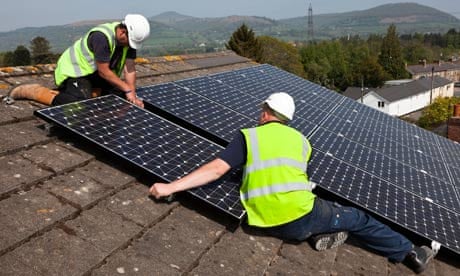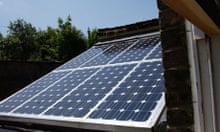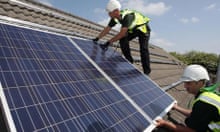Solar power subsides will be cut by half, the government said on Monday, as reported by the Guardian last Friday. Climate change minister Greg Barker, launching a consultation on feed-in tariff rates for solar photovoltaic panels, said he wanted to avoid the industry falling victim to "boom and bust".
"The plummeting costs of solar mean we've got no option but to act so that we stay within budget and not threaten the whole viability of the Fits scheme," said Barker. "Although I fully realise that adjusting to the new lower tariffs will be a big challenge for many firms, it won't come as a surprise to many in the solar industry who've themselves acknowledged the big fall in costs and the big increase in their rate of return over the past year."
The department of energy and climate change admitted its expectations had been far too low, with three times as much solar installed as it had projected, with over 100,000 installations so far.
The cut will almost double the payback period for householders, meaning someone installing £10-12,000 solar panels will only be in credit after 18 years rather than 10. The rate will be reduced from 43.3p per kWh of solar electricity to just 21p, cutting returns from around 7% to 4%.
Gaynor Hartnell, Chief Executive of the Renewable Energy Association (REA), said: "The REA had called for a more modest reduction some time ago. Had this been done, we'd have seen less boom and bust and the transition arrangements would be more straightforward. The installation rate is likely to fall drastically, and many of the 25,000 newly-employed in this industry may end up joining the dole queue."
Although the solar industry said it could bear the cuts, many companies said the reductions would hurt the poorest consumers hardest. Lower income households are more likely to rely on free deals, whereby the installer takes the subsidy but the household gets free power – often enough to rescue people from fuel poverty.
While a PDF prematurely leaked last Friday on the Energy Saving Trust website noted that "these proposals are currently under consultation and are not final", the figure is in line with earlier speculation that the rate would be cut by over half. It also said consumers considering solar should assume the 21p figure is what they will get if they install after 12 December, 11 days before the consultation closes.
A Decc spokeswoman said that the cut-off date was itself part of the consultation, and may change. Consumers who install solar before then will get the current higher rate; installs between 12 December 2011 and 1 April 2012 will get the higher rate before dropping to the lower rate after 1 April 2012; anyone installing after 1 April 2012 will just get the lower rate.
Howard Johns, MD of Southern Solar, who spotted the document, tweeted: "It seems that EST know exactly what the outcome of the Fit review already – so much for consultation." Toby Ferenczi, chief technology officer at solar company Engensa, wrote: "This isn't acceptable and will result in massive job losses – don't be fooled."
On Friday, a Decc spokesman said: "We'll be publishing a full consultation on changes to the solar PV tariff changes in parliament on Monday. The Energy Saving Trust inadvertently published a draft of documentation on its website that was neither final nor accurate." However, the figures are line with those disclosed by the Guardian.
The spokesman added that if government took no action now, by 2014-15, Fit payments for solar would be cost consumers £980m annually, adding £26 to electricity bills by 2020. Average electricity bills are estimated to be £556 by 2020, including the £26 if the Fits were not cut, according to Decc.
The government has argued that as the cost of solar power has come down, the subsidies should also be reduced as at present solar companies are absorbing some of the extra profits. Although the payback period has been reduced, the financial return at about 4% a year still beats most bank offerings and other financial investments available to individuals.
Prof Stephen Frankel, who chairs the Wadebridge Renewable Energy Network in Cornwall, which wants to install solar panels for free to local homes, warned the cuts would endanger the project.
"The Fit underpins these installations, and the benefits then flow not to outside speculators but are retained in the area and contribute to our community fund. This fund is available for local projects, as decided democratically by local people. We are now told that the Fit is to be curtailed drastically. If that is true, our efforts to act upon government advice and encouragement will have been for naught."
Daniel Green, of the solar installer HomeSun, said people without the money to invest £10,000 or more upfront in roof panels would be hardest hit, as suppliers would no longer find it worth their while to install solar panels for them.
HomeSun is one of a range of companies fitting solar panels to homes and community buildings for free: the roof-owner gains free energy, and the subsidies are kept by the installer. Proponents of these schemes argue that it helps to rescue people from fuel poverty.
Green said: "In the residential sector, providers of free solar panels are around 50% of installations and they will disappear at anything less than 28p per kWh. This means the less well-off will not be able to benefit from solar."
The news comes after the government signalled support for the 25,000 jobs in the fast-growing solar industry. Barker said the government wanted growth in solar panel installations to continue.
"We are determined not just to drive down carbon emissions but to build a successful, thriving, prosperous low-carbon economy," he told a solar power conference in Birmingham.
"I'm personally committed to ensuring that your industry can prosper in the longer term, sustaining green jobs at a critical time for our economy, jobs that people can build a career on [and] that can help drive the recovery."
Johns told the Guardian that the cuts would be a "disaster". "If they go ahead with this, the tariff is way too low, and all the social housing and free solar schemes – which make the feed-in tariffs exciting in terms of fuel poverty – will be destroyed." He added that this was the third government review into solar subsidies this year, saying: "We've invested business in PV [solar photovoltaic panels] and had it sliced up three times in a year. They [the government] have no credibility on this any more."
"You can't do U-turns like this without having to answer for it – it puts the spotlight firmly on the coaliton's green credentials," he said.
Seb Berry, head of public affairs at the UK's largest solar company, Solarcentury, said they would campaign against the proposals:
"The minister tried to reassure the industry yesterday that he supported this sector and valued our investment, jobs, innovation and rapid growth. Today those reassurances ring hollow."
Juliet Davenport, CEO of utility Good Energy, said: "Feed-in tariffs have been successful at the end of the day because they give households control over their energy supply, insulating themselves from price hikes and reducing their carbon footprint."
But consultancy PwC argued that the deep fast cuts proposed by the government were better than the risk of a bubble which would lead to over capacity in the short-term, followed by cuts later, which would mean sharper job losses. "A deep and fast cut in Fits will be required to protect the UK solar industry from stalling or creating a market bubble before any rate changes take effect," the consultancy said in a report on Friday.
On Thursday, Germany, the world's biggest solar panel market, said it will also cut subsidies for solar photovoltaic power. Rates will be reduced 15% from January 2012, the Bundesnetzagentur, the federal grid regulator, announced. Power from panels will earn between €0.18 and €0.24 per kWh, depending on size and location.
Deep cuts to the popular tariff have been overseen in recent years, with the German government arguing that economies of scale and improvements in technology are resulting in rapid reductions in the cost of the sector, meaning the industry no longer needs such a high-level of state aid. Since Germany's Renewable Energy Sources Act (EEG) was introduced 11 years ago, providers are guaranteed fixed prices for the electricity they feed into the grid. Like the UK scheme it is paid for by consumers, adding €0.036 per kWh on energy bills or, according to calculations by the Rheinish-Westphalian Institute for Economic Research (RWI), €85.4bn for the solar built between 2000 and 2010 and ensuing payments.
The Bundesnetzagentur revises the tariff regularly. A 9% reduction every year is given by law, but it can be higher depending on actual new installations. Matthias Kurth, president of the federal grit regulator, said: "During the past 12 months an additional new capacity of approximately 5,200MW has been registered. This figure results in 15% lower remuneration compared to the actual Fit for systems connected to the grid from January 1 2012." The rate could have been cut by as much as 24% (the annual cut's ceiling) if a larger amount of solar had been added.
In 2010, Germany added a record 7,400MW solar power, and small green energy firms have become sizeable within just a few years. The renewable industry supports 380,000 jobs in total, 108,000 within the photovoltaic industry alone. "Germany is the global market leader in the renewable energy sector," the German environment minister, Norbert Röttgen, said.
However, German solar cell manufacturers are struggling to keep up now that prices are collapsing and Chinese suppliers are flooding the market. "The prices are falling more rapidly than German manufacturers expected. But they will prevail in the long time because of the better quality," Daniel Kluge from the German Renewable Energy Federation said.
Note: An earlier version of this article stated that German solar subsidies would be "between €17.94 and €24.43 per kWh" from 2012. The figures should in fact be Euro cents. not Euros, and this has been corrected. The same error was made with the "€3.59 per kWh" added to German energy bills.



Comments (…)
Sign in or create your Guardian account to join the discussion